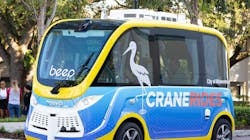ACES Coalition launches strategy for autonomous vehicle reform
Ten public and private stakeholders have launched the Automated Connected Electric Shared (ACES) Mobility Coalition, a cooperative effort across the transportation sector dedicated to accelerating the full integration of automated, connected, electric, shared-use vehicles in mobility networks across the United States.
As Congress and multiple states consider bipartisan autonomous vehicle (AV) legislation, the ACES Mobility Coalition was established to ensure reforms consider safety, equity, sustainability and the good-paying jobs associated with an emerging industry.
To ensure a comprehensive approach to AV deployment, safety and job creation, the ACES Mobility Coalition is committed to engaging federal and state policymakers and regulators, in addition to institutions of higher education, labor unions, nonprofit organizations and other key transportation stakeholders.
The group’s priorities include:
- Safety and incremental innovation at the core: The ACES Mobility Coalition emphasizes an incremental approach to autonomous travel, recognizing that not all autonomous technologies advance at the same pace. The ACES Mobility Coalition believes AVs designed to operate at lower speeds along planned routes within defined environments offer the best opportunity to advance innovation while prioritizing safety and consumer acceptance.
- Inclusivity and job creation: The ACES Mobility Coalition stands firm on the principle that driver-less mobility does not mean human-less mobility. Autonomous driving technology will create new job opportunities in manufacturing, maintenance, software development and remote supervision. The goal is to augment and strengthen existing shared mobility, not replace it. The ACES Mobility Coalition will advocate for policies that will attract and retain manufacturers of the next-generation technology and the jobs they will create.
- Focus on the benefits of shared-use autonomous travel: The ACES Mobility Coalition calls on Congress to ensure reforms are inclusive of the next generation of automated vehicles, which will weigh more than personal vehicles but less than commercial vehicles. Ensuring transportation planners have the ability to integrate autonomous, connected, electric, shared vehicles into their networks will address core transportation concerns related to road safety, connectivity, accessibility, congestion, carbon emissions and noise pollution, which are caused and compounded by having too many cars on the road and not enough viable alternatives for shorter trips.
The ACES Mobility Coalition looks forward to working collaboratively with federal agencies, lawmakers, and other stakeholders to shape a future with widespread adoption of shared autonomous mobility that will reduce single occupancy vehicle trips, reduce traffic, improve air quality, protect vulnerable road users, preserve and expand equitable transit access and enable safe, convenient mobility for all.
ACES Mobility Coalition Founding Members include:
- Public members: City of Altamonte Springs, Fla., Contra Costa Transportation Authority, Houston Metro, Jacksonville Transportation Authority, Lynx, Metra, MetroLink, Pinellas Suncoast Transit Authority, Regional Transportation Commission of Southern Nevada.
- Private members: Beep, Inc.
